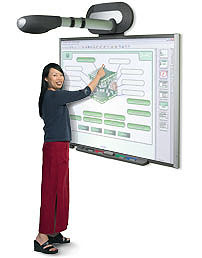 I was thinking the other night about my job. I really don't think things will be done in the classroom much longer. Distance learning is becoming more common in the rural schools. Small schools that can't hire language specialists use video conferencing to share resources across entire counties, and the whole of secondary education may not be far behind.
I was thinking the other night about my job. I really don't think things will be done in the classroom much longer. Distance learning is becoming more common in the rural schools. Small schools that can't hire language specialists use video conferencing to share resources across entire counties, and the whole of secondary education may not be far behind.
The time will come soon when the cost of maintaining an informational network from students' homes will be more effective than bringing them to school. I forsee personal instruction presented from a central location by a teacher using a type of Smartboard (seen at left), which would be used to control a networked group of student-operated computers with two-way visual communication, forming a virtual classroom. As the teacher writes on the board, the text is read and transformed into a legible font, easily read by students on their own displays at home. The entire presentation could be viewed by students in their homes, recorded and reviewed at their leisure. They could even use a pause feature, like a DVR or a Tivo has, allowing them to use the restroom, catch up on notetaking, or for whatever reason. The teacher would have to build in a buffer time to allow everyone to catch up and ask questions. If a student had a question to ask, they could pause the presentation, mute their audio pickup, and record the question for playback at a suitable time.
In my virtual classroom, the teacher's computer could monitor the attention paid to the presentation by scanning the movement of the student's eyes. We currently have reading diagnostic hardware that tracks eye movement, and in 15 years it should be sufficiently advanced to serve this purpose. If the eyes close for too long or the student avoids or abandons the classroom camera, participation points could be deducted and the computer would tabulate the percentage of time the student spent on task. The student behavior could also be recorded for parent review, if there were to be questions about "What did you do at school today?" The teacher could also apportion a part of the Smartboard to monitor what the student is doing on their own interface. My wife is already capable of doing this in her computer lab, monitoring which computer applications her students are using on the classroom computers. The teacher could also use this function to quickly assess student understanding of the work as it is being done, and using a stylus, could make helpful suggestions on each student's monitor.
Ordinarily, the teacher would have two-way interaction with each student, but the students would only see and hear each other when the teacher wished it. When an appropriate time came up to ask questions, the teacher could fully conference the network so that students could interact, but each student's verbal contribution would lockout the others' audio pickups so that no interruption could take place. The teacher could also group the students so that they were working in teams in the virtual classroom, and the teacher could sort the students by a database of information at the teacher's command. The students could be grouped by general mathematical ability, their current grades, or even by measures recorded from their standardized tests. These are simple Excel functions that can be done now, but with the power of the computer at the teacher's fingertips, they could be accessed instantly and groups quickly made for any task.
Textbooks would be a thing of the past in the virtual classroom, as necessary texts would be loaded on the server and accessed on the student display as needed. Teachers could modify assignments at the touch of the screen by simply highlighting the problems that they want to omit and deleting them from the day's assignments.
Classroom behavior would be easily handled in this system. With the classroom apportioned on the Smartboard, all a teacher would have to do to draw attention back where it should be is to tap the screen over the image of the offending student's face. This would illuminate a small message on the student's display, letting the student know that their behavior needs to be adjusted. After a set number of warnings have been ignored, the teacher could then remove the student from the interactive feature, leaving the student able to watch, but not participate actively. This is far better than suspension from the classroom and not as disruptive to the rest of the class.
The benefits of the system would enormous. The costs of building and maintaining new schools are skyrocketing. One neighboring district just built a new high school complex to the tune of $60 million. Transportation costs rise with fuel, which is also skyrocketing. Bus drivers and mechanics, custodians, cafeteria staff, security, all will be unnecessary. Of course there will be a higher demand for network engineers and computer maintenance, but those would be better-paying jobs anyway.
The amount of time spent by students actually learning would be maximized. There would be less time spent dealing with behavior issues. There would be no fights. There would be no spread of contagious illnesses. There would be no physical assaults on teachers, or on students for that matter. Let's be honest, these kids will be social regardless of school. Their social skills will not degrade any more than they already have. Snow days would be a thing of the past, but occasional network problems would likely delay school, but probably no more often than it happens now. No substitute teacher would be required if teachers pre-recorded planned lessons that students could watch and work on independently.
I posed the possibility of my virtual classroom idea to my students and every counter-idea they came up with was no worse than what we have in place now, and there was a heck of a lot more upside in what I suggest. What do you think?



1 comment:
There are a lot of benefits to what you are suggesting IMO. But how are the little darlings going to pass notes (or drugs, contraband etc)and cheat on the tests that way??? LOL
One thought on the subject tho, band class would be a little difficult to do that way wouldn't it?? I don't know, just a thought.
Post a Comment